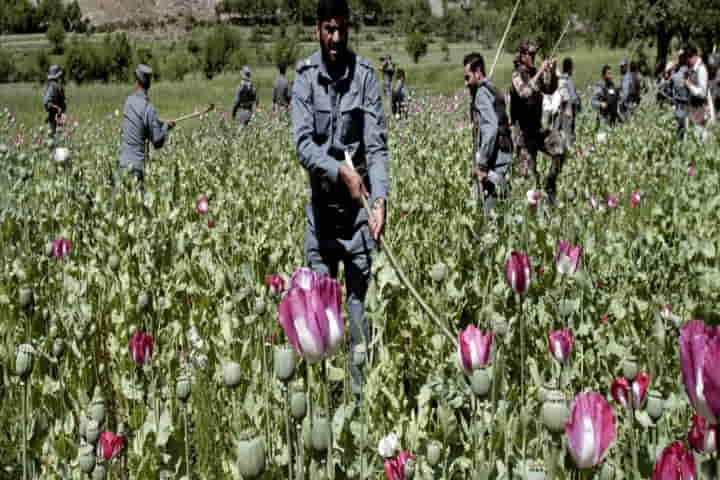

Poppy fields in Afghanistan
<p>
<strong>Now that Afghanistan under Taliban&rsquo;s control, the country, the so-called &ldquo;graveyard of empires&rdquo; be renamed as the Islamic Emirate of Afghanistan (IEA), steered by Sharia law? As the primary source of opium, in the world, will narcotics become Taliban&rsquo;s most profitable source of income? Will religious fanaticism be used to cover the nefarious deeds of a narco-state? Earlier, the group was cultivating opium in areas under their control. But now, with the entire country under its control, the stage is set for Afghanistan to become Asia&rsquo;s first narco-state.&nbsp;</strong></p>
<p>
Taliban&rsquo;s track record that Taliban has re-emerged from rehab, with a strong will to transition the&nbsp; Even after being thrown out by the US in 2001, the Taliban never had to worry about money because they could literally grow it. While the Taliban has successfully diversified its streams of revenue over the last two decades, the heroin and meth trade still play a prominent role in its profit and governance model.</p>
<p>
Gretchen Peters, author of &ldquo;How Drugs, Thugs, and Crime Are Reshaping the Afghan War&rdquo; writes, in 1980s, how the insurgent commander Mullah Muhammad Nasim Akhundzada &ldquo;set production quotas, implemented a predatory loan service to small poppy farmers&rdquo;, and &ldquo;reportedly threatened farmers who failed to plant poppy with castration or death&rdquo;.</p>
<p>
&ldquo;We must grow and sell opium to fight our holy war,&rdquo; he used to say.</p>
<p>
<strong>Also read: <a href="https://www.indianarrative.com/world-news/the-taliban-what-is-their-source-of-income-108196.html">The Taliban: What is their source of income?</a></strong></p>
<p>
Today the Taliban is thriving with drug money. In the last two decades, the US and the Afghan government tried to destroy, Taliban&rsquo;s source of revenue but failed. Now the group with illegal activities will be getting &ldquo;recognition&rdquo; by the world.</p>
<p>
The Taliban banned poppy growing in 2000 as they sought international legitimacy, but faced a popular backlash and later mostly changed their stance.</p>
<p>
According to the <a href="https://www.sigar.mil/pdf/lessonslearned/SIGAR-18-52-LL.pdf">UN report</a>, the Taliban earns $3billion from exports of opium poppy, the country&rsquo;s largest cash crop.</p>
<p>
Today Afghanistan cultivates twice the acreage of opium poppy as it did before 2001. The new Taliban regime will have no incentive to transition away from narcotics in the hope of attracting aid or investment.</p>
<p>
Now that the Taliban controls Afghanistan, it will be able to use the institutions of the state to expand its trade in drugs. The group will also control access to regional transport links, such as the highway to Chabahar port in Iran and the International North-South Transportation Corridor to Central Asia, Iran, Russia, and Europe.</p>
<p>
The US spent more than $8 billion over 15 years on efforts to deprive the Taliban of their profits from Afghanistan&#39;s opium and heroin trade, from poppy eradication to airstrikes and raids on suspected labs but on the other hand, Taliban earned more than that.</p>
<p>
The UN officials are concerned that Afghanistan&rsquo;s slide into chaos will create conditions for even higher illicit opiate production, a potential boon to the Taliban.</p>
<p>
<strong>Also read: <a href="https://www.indianarrative.com/india-news/in-afghanistan-fruit-exports-are-stranded-but-poppy-trade-zooms-99948.html">In Afghanistan, fruit exports are stranded but poppy trade zooms</a></strong></p>
<p>
&quot;The Taliban have counted on the Afghan opium trade as one of their main sources of income,&quot; Cesar Gudes, the head of the Kabul office of the U.N. Office of Drugs and Crime (UNODC), told Reuters. &quot;More production brings drugs with a cheaper and more attractive price, and therefore a wider accessibility.&quot;</p>
<p>
Three of the last four years have seen some of Afghanistan&rsquo;s highest levels of opium production, according to the UNODC. Even as the COVID-19 pandemic raged, poppy cultivation soared 37 percent last year, it reported in May. The estimated all-time high for opium production was set in 2017 at 9,900 tons worth some $1.4 billion in sales by farmers or roughly 7% of Afghanistan&#39;s GDP, the UNODC reported.</p>
<p>
&ldquo;No one can run the country without controlling the drug trade. A Taliban victory was inevitable because it was easy to use drug money to nurture and exploit rampant corruption at every level of the Afghan govt.,&rdquo; says one Afghan official, adding that patronage is deeply ingrained in tribal politics. Bribery is just part of doing business.</p>
<p>
Afghanistan is landlocked, and its borders leak opium like sieves into five neighboring countries. In recent years, the northern route to Russia and Europe via Tajikistan has gained importance, but the southern route through Balochistan still accounts for the largest portion of opium that leaves the country. From there, it is smuggled into Iran, and then onward to the Balkans, the Persian Gulf and Africa. Most of it is destined for Western Europe.</p>
<p>
Now in power, It is unlikely the Taliban will prohibit poppy cultivation and trade. Like Mexico, Venezuela or Colombia narcos, Taliban does not have to &ldquo;influence&rdquo; any government, now Taliban narco is a government itself.</p>
The Indo-French Joint Military Exercise SHAKTI-VIII continues to strengthen operational interoperability and mutual cooperation between…
Prime Minister Narendra Modi attended the centenary celebrations of the revered Jain spiritual leader Acharya…
Prominent human rights activist Manzill Murshid anticipated that the upcoming election in Bangladesh will bring…
Iranian Foreign Minister, Seyed Abbas Araghchi, said on Saturday that President Donald Trump should put…
The national capital is hosting ten representatives from the American state of Montana, who are…
An earthquake of magnitude 6.0 struck the Philippines in the early hours of Saturday, as…